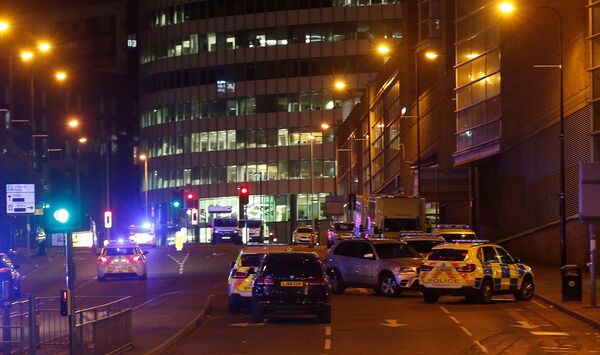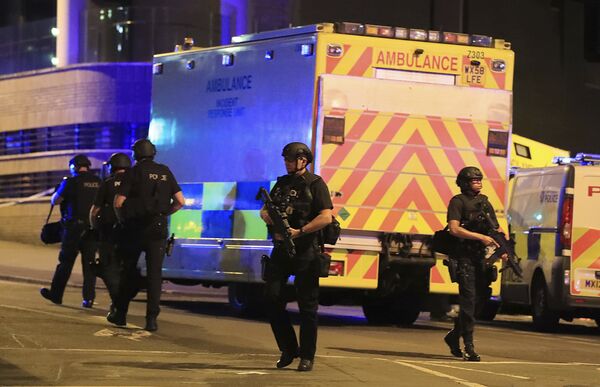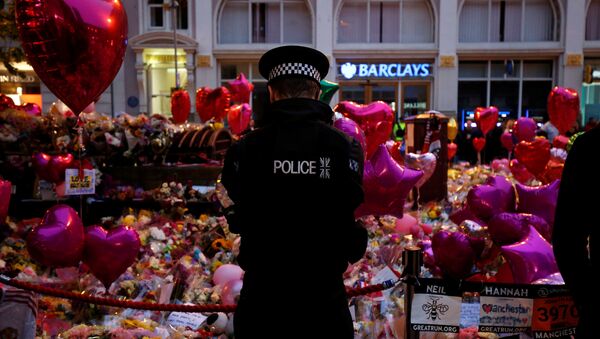Within minutes of the Manchester attacks, ambulance services had arrive, the police had cornered off roads and the injured were being taken to hospital.
The key groups — ambulance, police, fire services and forensic teams — prepare for these incidents carefully and delicately. They know what to do as they have practiced numerous times for such an event.

Emergency Services
All emergency services have response plans, which are documented in the UK governments counter terrorism strategy. The Manchester attack was beyond the capabilities of just one hospital. Dr. Richards told Sputnik that the speed of first responders is often overlooked, but it's crucial in a attack of big scale.
"There are number of things that need dealing with and removing from the scene, such as injured people who need to be treated. There may be other issues to deal with such as structural concerns of buildings so the fire services will need to look at how people are moved and the police have to work on controlling the traffic and making sure the ambulances can get in and out. They put a lot of work into dealing with this. The major incidents rarely take place, but when they do they are well prepared for it," Dr. Richards told Sputnik.

The police, according to Dr. Richards, will ensure everything swings into action.
"They do a great job at coordinating everything that is going on around them. If there has been a chemical or nuclear leak, the police might have to call in specialist military. The local police commander is central however to ensuring everything runs smoothly."
The Forensic Team
Once the attack has taken place, as well as the emergency services, the forensic team will also be there fairly quickly. The Manchester attacker was a man named Salman Abedi who used an explosive device to kill and injure people. The forensic team would have to look for evidence of how the bomb was made and ensure the information extracted is used to inform government intelligence agencies around the world.
"The forensics team will step in quickly, in the early hours people will be moving around and the primary response is to deliver a duty of care to people. You don't want to move people and disturb forensic evidence. Getting forensics is critical," Dr. Richards told Sputnik.
The Government
The scale of the Manchester attack and other similar atrocities such as the 7/7 London tube bombing in 2005, means that the government has to alert the public immediately. The Prime Minister will often tell the media that they are attending a Cobra meeting, it stands for Cabinet Office Briefing Room A. Cobra is the British government's emergency response committee set up to respond to a national or regional crisis.
When the Manchester attacks struck the UK PM Theresa May addressed the country, within 24 hours. The threat level also went up from severe to critical.
We all – every single one of us – stand with the people of Manchester at this terrible time. pic.twitter.com/vMTwaBbncl
— Theresa May (@theresa_may) May 23, 2017
With all of these operational tasks taking place, the question asked by experts and citizens is: if the security services are so prepared, why were they not able to monitor Salman Abedi and prevent the attack?
This poor little angel. Second victim confirmed as Saffie Rose Roussos, 8 years old. Remember the victims, not the perpetrators. #Manchester pic.twitter.com/nGbqwjrFfk
— Alexandra Zarrah (@Ali_ZONeill) 23 May 2017
Dr. Richards believe that the blaming or making the security a scapegoat is the wrong approach, especially given the fact that it's been over 10 years since the 7/7 bombing in London.
"It's a scale issue, the number of people who may attack runs into the thousands and the security services haven't got the time or resource to investigate everyone who is a threat. They have to make tough priority decisions. It's been more than 10 years since we have had a major attack of this sort and in that time a large amount of arrests have been made. It's impossible to prevent every attack," Dr. Richards told Sputnik.


